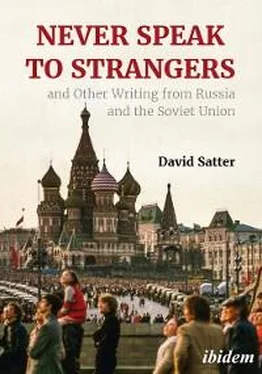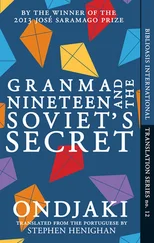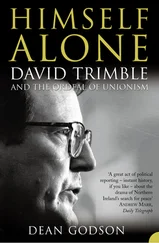ibidem-Press, Stuttgart
Content
Abbreviations and Administrative Delineations Abbreviations and Administrative Delineations FSB — Federal Security Service FSO — Federal Guard Service IMF — International Monetary Fund KGB — Committee for State Security RUBOP (formerly RUOP) — Regional Directorate for the Struggle with Organized Crime SVR — Foreign Intelligence Service Krai — Province or territory Oblast — Region Raion — District Okrug — Administrative subdivision, for example, of Moscow or military district
Introduction
Never Speak to Strangers
Impressions of Moscow: Beyond the Looking Glass
Soviets’ Long Queue to Nowhere
Angry Russians Can’t Understand Inflation
The Dissidents Who Strive for Western Freedoms in Russia
The Ghost in the Machine
The Price of Respectability
Taking a Healthy Rest
The Price of Soviet Achievements
A Burning Issue
From Russia Without Love
Trials of the Workers
The Price of Calling the Helsinki Bluff
Shaken, but Ready to Rise Again
Soviet Dissent and the Cold War
Why Moscow Has Georgia on Its Mind
Angry Nationalist Struggle Against Soviet Power
Afghanistan’s Rocky Road to Socialism
Russia’s ‘Civilised North’
Moscow Yields to ‘Interference’
Tensions Between Systems Show at Summit
Bitter-Sweet Search for Ancestors in Ukraine
The Crime That Can Only Exist Behind Closed Borders
Planning and Politics Strangle the Soviet Economy
Josef Stalin’s Legacy Leaves Soviet Leaders in Dilemma
Sakharov’s Arrest Links Dissidence with Detente
The Limits of Detente
200 Soviet Officials Held
Fighting a War of Shadows
Moscow Starts ‘Phoney War’ Over Peace
Why the Russians Think They Have Taken Schmidt for a Ride
Russia Through the Looking Glass
View from Middle Russia
How the Kremlin Kept Moscow Under Wraps
Russia Keeping Its Hands off Poland
Where Some Miners Are More Equal Than Others
Moscow Weighs Gains and Losses Against Dictates of Ideology
Soviet Defeat in Poland
Few Goods in Grocery Store 7
The Soviet View of Information
A Match for the Soviets
The KGB Puts Down a Marker
The System of Forced Labor in Russia
The Soviets Freeze a Peace Worker
What Russia Tells Russians About Afghanistan
The Legacy of Leonid Brezhnev
The Soviets Slam the Door on Jewish Emigration
Soviet Threat Is One of Ideas More Than Arms
Treating Soviet Psychiatric Abuse
The Kremlin Tortures a Psychiatrist
Yuri Andropov: The Specter Vanishes
Private Soviet Screenings of Forbidden Films? Insane!
In New Gulag, Soviets Turning to Murder by Neglect
Don’t Talk with Murderers
Moscow Feeds a Lap-Dog Foreign Press
Moscow’s ‘New Openness’ Illusion
A Test Case
Why Glasnost Can’t Work
A Journalist Who Loved His Country
Response to Fukuyama
Winter in Moscow
Setting the Sverdlovsk Story Straight
Moscow Believes in Tears
The Seeds of Soviet Instability
The Rise of Nationalism
Yeltsin: Shadow of a Doubt
A Tragic Master Plan
The Failure of Russian Reformers
Rude Awakening
Yeltsin: Modified Victory
Organized Crime Is Smothering Russian Civil Society
The Wild East
The Shadow of Aum Shinri Kyo
The Cost of the Yeltsin Presidency
The Rise of the Russian Criminal State
David Satter interviews Ida Milgrom, the mother of Jewish dissident, Anatoly Shcharansky, outside the courthouse in Moscow where Shcharansky was tried in July, 1978. In the background (center) is Kevin Klose, Moscow correspondent of The Washington Post (photo by Robin Knight).
The Human Rights Situation in Russia
Anatomy of a Massacre
The Shadow of Ryazan
Not so Quick
Death in Moscow
Stalin’s Legacy
A Low, Dishonest Decadence
Terror in Russia: Myths and Facts
Ordinary Monsters
The Murder of Paul Klebnikov
The Tragedy of Beslan
The Communist Curse
Stalin Is Back
What Andropov Knew
G-8 Crasher
Nikita Khrushchev’s Hard Bargains
Who Killed Litvinenko?
Boris Yeltsin
Russia on Trial
Land for Peace
Putin Changes Jobs—and Russia
Poisonous Patriotism
Obama and Russia
Who Murdered These Russian Journalists?
Obama’s Outreach to Muslims Won’t Achieve Its Goal
Putin Runs the Russian State —and the Russian Church Too
Mission to Moscow
Obama’s Russian Odyssey
Psyching out U.S. Leaders
The President’s Mission to Moscow
The Summit: Day 2
Natalya Estemirova
A Wounded Bear Is Dangerous
Pining for Authoritarianism
Remembering Beslan
Afghanistan: Lessons from the Soviet Invasion
Yesterday Communism, Today Radical Islam
A Passion to Relive the Past
Road to ‘Zero’
Symposium: Is Hannah Arendt Still Relevant?
Women Who Blow Themselves Up
A Hollow Achievement in Prague
Symposium: When Does a Religion Become an Ideology?
That Russian Spy Ring: The Broader Meaning
Never Forget: New Fanatical Ideology, Same Prescription: Defeat
Khodorkovsky’s Fate
Putin’s Facade Begins to Crumble
Why Putin Is Tottering
The Character of Russia
Obama’s Open Microphone
Russia’s Chance for Redemption
Russia and the Communist Past
Awaiting the Next Revolution
Clinton in the WSJ Strays on Russia Relations
Punk-Rock Authoritarianism
The Long Shadow of “Nord Ost”
Russia’s Orphans
David Satter on Life in the Soviet Police State
Russians Arrest CIA Agent
The NSA and the Soviet Union
Obama Defends Putin
Russia’s False Concern for Children
Putin and Obama in St. Petersburg
The Curse of Russian “Exceptionalism”
Snowden’s New Identity
Did Putin Insult the Pope?
Why Journalists Frighten Putin
Open Letter to Margarita Simonyan, Chief Editor of Russia Today
My Expulsion from Russia
Putin’s Shaky Hold on Power
The Russian State of Murder Under Putin
Putin Is No Partner on Terrorism
Russia Questions for Rex Tillerson
The ‘Trump Report’ Is a Russian Provocation
Trump Gives a Boost to Putin’s Propaganda
From Russia With Chaos
Trump Must Stand Strong Against Putin
How America Helped Make Vladimir Putin Dictator for Life
Who Killed Boris Nemtsov?
100 Years of Communism —and 100 Million Dead
A Christmas Encounter With the ‘Russian Soul’
How to Answer Russia’s Escalation
Putin’s Aggression Is the Issue in Helsinki
The Satirist Who Mocked the Kremlin —and Russian Character
When Russian Democracy Died
Contribution to “We Need Sakharov”
Collusion or Russian Disinformation?
A Pioneer Who Witnessed Revolutions
Hold Russia Accountable for MH17
Afterword to English Language Edition of Judgment in Moscow
Acknowledgements
Abbreviations and
Administrative Delineations
FSB — Federal Security Service
FSO — Federal Guard Service
IMF — International Monetary Fund
KGB — Committee for State Security
RUBOP (formerly RUOP) — Regional Directorate for the Struggle with Organized Crime
SVR — Foreign Intelligence Service
Krai — Province or territory
Oblast — Region
Raion — District
Okrug — Administrative subdivision, for example, of Moscow or military district
The Marquis de Coustine, writing in the early 19th century, said that it was possible for a foreigner to travel from one end of Russia to the other and see nothing but false facades. In June, 1976, when I arrived in Moscow as the accredited correspondent of the Financial Times of London, I was confronted by a country that resembled nothing so much as a giant theater of the absurd.
Читать дальше












